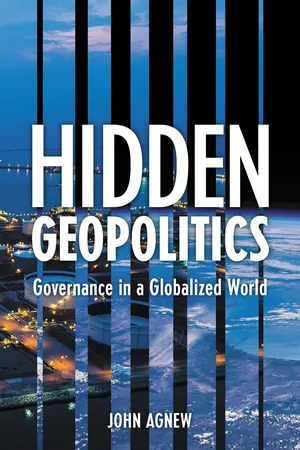
- English
- ePUB (mobile friendly)
- Available on iOS & Android
eBook - ePub
About this book
A 2023 Choice Reviews Outstanding Academic Title
Geopolitics is not dead, but nor does it involve the same old logic of a world determined by physical geography in a competition between Great Powers. Hidden Geopolitics recaptures the term to explore how the geography of power works both globally and nationally to structure and govern the workings of the global political economy. Globalization, far from its antithesis, is tightly wound up in the assumptions and practices of geopolitics, relating to the scope of regulatory authority, state sponsorship, and the political power of businesses to operate worldwide. Agnew shows how this "hidden" geopolitics and globalization have been vitally connected. He focuses on three moments: the origins of contemporary globalization in the policies pursued by successive US governments and allies after 1945 and its continued relevance even as the US role in the world changes; the close connection between geopolitical history and status of different countries and their relative capacities to exploit the possibilities and limit the costs of globalization; and new regulatory and standard-setting agencies which emerged under the sponsorship of major geopolitical powers but have grown in power and authority as the dominant states have become limited in their ability to manage the explosion of transnational transactions on their own.
Agnew argues that it is time to move on from the narrow inter-imperial cast of geopolitics and the foolish policy advice it produces. The old perspective on geopolitics has taken on new life with the rise of national-populist movements in Europe and the United States and the reinvigoration of territorial-authoritarian regimes in Russia and China. Notwithstanding this trend, we must see the contemporary world through the lens of these complex, "hidden" geopolitical underpinnings that Agnew seeks to expose.
Geopolitics is not dead, but nor does it involve the same old logic of a world determined by physical geography in a competition between Great Powers. Hidden Geopolitics recaptures the term to explore how the geography of power works both globally and nationally to structure and govern the workings of the global political economy. Globalization, far from its antithesis, is tightly wound up in the assumptions and practices of geopolitics, relating to the scope of regulatory authority, state sponsorship, and the political power of businesses to operate worldwide. Agnew shows how this "hidden" geopolitics and globalization have been vitally connected. He focuses on three moments: the origins of contemporary globalization in the policies pursued by successive US governments and allies after 1945 and its continued relevance even as the US role in the world changes; the close connection between geopolitical history and status of different countries and their relative capacities to exploit the possibilities and limit the costs of globalization; and new regulatory and standard-setting agencies which emerged under the sponsorship of major geopolitical powers but have grown in power and authority as the dominant states have become limited in their ability to manage the explosion of transnational transactions on their own.
Agnew argues that it is time to move on from the narrow inter-imperial cast of geopolitics and the foolish policy advice it produces. The old perspective on geopolitics has taken on new life with the rise of national-populist movements in Europe and the United States and the reinvigoration of territorial-authoritarian regimes in Russia and China. Notwithstanding this trend, we must see the contemporary world through the lens of these complex, "hidden" geopolitical underpinnings that Agnew seeks to expose.
Frequently asked questions
Yes, you can cancel anytime from the Subscription tab in your account settings on the Perlego website. Your subscription will stay active until the end of your current billing period. Learn how to cancel your subscription.
No, books cannot be downloaded as external files, such as PDFs, for use outside of Perlego. However, you can download books within the Perlego app for offline reading on mobile or tablet. Learn more here.
Perlego offers two plans: Essential and Complete
- Essential is ideal for learners and professionals who enjoy exploring a wide range of subjects. Access the Essential Library with 800,000+ trusted titles and best-sellers across business, personal growth, and the humanities. Includes unlimited reading time and Standard Read Aloud voice.
- Complete: Perfect for advanced learners and researchers needing full, unrestricted access. Unlock 1.4M+ books across hundreds of subjects, including academic and specialized titles. The Complete Plan also includes advanced features like Premium Read Aloud and Research Assistant.
We are an online textbook subscription service, where you can get access to an entire online library for less than the price of a single book per month. With over 1 million books across 1000+ topics, we’ve got you covered! Learn more here.
Look out for the read-aloud symbol on your next book to see if you can listen to it. The read-aloud tool reads text aloud for you, highlighting the text as it is being read. You can pause it, speed it up and slow it down. Learn more here.
Yes! You can use the Perlego app on both iOS or Android devices to read anytime, anywhere — even offline. Perfect for commutes or when you’re on the go.
Please note we cannot support devices running on iOS 13 and Android 7 or earlier. Learn more about using the app.
Please note we cannot support devices running on iOS 13 and Android 7 or earlier. Learn more about using the app.
Yes, you can access Hidden Geopolitics by John Agnew in PDF and/or ePUB format, as well as other popular books in Politics & International Relations & Political Economy. We have over one million books available in our catalogue for you to explore.
Information
Table of contents
- Preface
- Acknowledgments
- Introduction
- Part I: Hidden Geopolitics
- Part II: Geopolitics of Globalization
- Part III: Geopolitics of Development
- Part IV: Geopolitics of Global Regulation
- Part V: Hidden No More?
- References
- About the Author